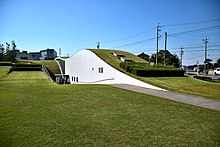Nankichi Niimi
This article needs additional citations for verification. (February 2011) |

Nankichi Niimi (新美 南吉, Niimi Nankichi, July 30, 1913 – March 22, 1943) was a Japanese author, sometimes known as the Hans Christian Andersen of Japan.[citation needed]
Niimi was born Shōhachi Watanabe (渡邊 正八, Watanabe Shōhachi) in Yanabe, in the city of Handa, Aichi prefecture, on July 30, 1913. He lost his mother when he was four years old. His literary skill was noticeable at an early age. During his elementary school graduation ceremony, he presented a haiku that impressed most people at the ceremony.
- The Dandelion
- So Many Days Trampled
- Today’s Flower
At age 18, Niimi moved to Tokyo to enter the Tokyo University of Foreign Studies. He fell sick with tuberculosis while in Tokyo shortly after graduating, and returned to his hometown. He worked there, first as an elementary school teacher, then as a women's high school teacher. He died at age 29.
Although not prolific, he shows great talent in all of his writings. His works are known for their accuracy and lively depictions of humans. He is also often compared to Kenji Miyazawa. There is a Niimi Nankichi Memorial Museum in his birthplace, Handa.
Works

(Some are given only with the Japanese title)
- Gon, the Little Fox (Japanese: ごんぎつね): This is his most famous work, which he wrote when he was only seventeen years old. This story of an orphaned fox that dies young somewhat parallels his own life.
- Buying Mittens (Japanese: 手袋を買いに): This is another famous work of his.
- Grandfather’s Lamp (Japanese: おぢいさんのランプ), published 1942
- Hananoki Village and the Thieves (Japanese: 花のき村と盗人たち)
- A Tale of Ryôkan: a Ball and a Child at a Basin, published 1941
- Ushi wo tsunaida tsubaki no ki (Temporary Translation: A camellia tree to which a cow was tethered)
- Lie (Japanese: うそ)
See also
References
External links
- e-texts of Niimi Nankichi's works at Aozora bunko (in Japanese)
- Synopsis of Hananoki Village and the Thieves (English)
- Synopsis of Grandfather's Lamp (English)
- Japan Mint: 2007 Coin Set with the story of Gon, the Little Fox
- Works by or about Nankichi Niimi at Internet Archive
- Works by Nankichi Niimi at LibriVox (public domain audiobooks)

 Media related to Nankichi Niimi at Wikimedia Commons
Media related to Nankichi Niimi at Wikimedia Commons
- Articles needing additional references from February 2011
- All articles needing additional references
- Articles containing Japanese-language text
- All articles with unsourced statements
- Articles with unsourced statements from February 2007
- Articles with Internet Archive links
- Articles with LibriVox links
- Commons category link is on Wikidata
- Articles with FAST identifiers
- Articles with ISNI identifiers
- Articles with VIAF identifiers
- Articles with GND identifiers
- Articles with J9U identifiers
- Articles with LCCN identifiers
- Articles with NDL identifiers
- Articles with NKC identifiers
- Articles with NLK identifiers
- Articles with NTA identifiers
- Articles with CINII identifiers
- Articles with SUDOC identifiers
- 1913 births
- 1943 deaths
- Writers from Aichi Prefecture
- People from Handa, Aichi
- Fabulists
- 20th-century Japanese poets
- 20th-century deaths from tuberculosis
- Tuberculosis deaths in Japan
- All stub articles
- Japanese writer stubs